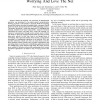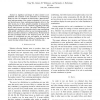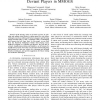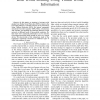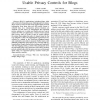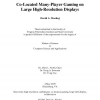CSE
2009
IEEE
14 years 6 months ago
2009
IEEE
—When the Internet was conceived, its fundamental operation was envisioned to be point-to-point communication allowing anybody to talk directly to anybody. With its increasing su...
CSE
2009
IEEE
14 years 6 months ago
2009
IEEE
—A significant percentage of online content is now published and consumed via the mechanism of crowdsourcing. While any user can contribute to these forums, a disproportionately...
CSE
2009
IEEE
14 years 6 months ago
2009
IEEE
Abstract—The permanent growth of personal music collections caused by the ongoing digital revolution asks for novel ways of organization. Traditional list based approaches are—...
CSE
2009
IEEE
14 years 6 months ago
2009
IEEE
—Multi-agent systems are difficult to develop. One reason for this is that agents are embedded in a society where all agents must agree to obey certain social norms in order for...
CSE
2009
IEEE
14 years 6 months ago
2009
IEEE
Abstract—We present a comparative analysis of the behavioral dynamics of rural and urban societies using four years
CSE
2009
IEEE
14 years 6 months ago
2009
IEEE
Abstract—Gold farming refers to the illicit practice of gathering and selling virtual goods in online games for real money. Although around one million gold farmers engage in gol...
CSE
2009
IEEE
14 years 6 months ago
2009
IEEE
—In this paper, we propose to leverage social graphs from Online Social Networks (OSN) to improve the forwarding efficiency of mobile networks, more particularly Delay Tolerant ...
CSE
2009
IEEE
14 years 6 months ago
2009
IEEE
—Web 2.0 applications, including blogs, wikis and social networking sites, pose challenging privacy issues. Many users are unaware that search engines index personal information ...
CSE
2009
IEEE
14 years 6 months ago
2009
IEEE
— To counteract current trends in network malware, distributed solutions have been developed that harness the power of collaborative end-host sensors. While these systems greatly...
CSE
2009
IEEE
14 years 6 months ago
2009
IEEE
